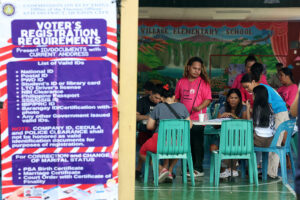
Analysts flag possible wasteful spending ahead of 2025 elections
By Kenneth Christiane L. Basilio, Reporter
THE PHILIPPINE government is expected to put in billions of pesos in wasteful spending to curry favor with voters ahead of midterm elections next year, analysts said.
The ability of incumbent politicians to boost public spending or money aggregates to satisfy voters could stoke inflation, they added.
“Sitting politicians may use government funds that are directed toward influencing voting preferences… this is assumed to cause a surge in infrastructure projects, provision of goods, and proliferation of services-based initiatives,” Arjan P. Aguirre, who teaches political science at the Ateneo de Manila University, said in a Facebook Messenger chat.
Midterm elections are scheduled on May 12, 2025, when Filipinos will elect senators, congressmen and local officials.
The polls are still less than a year away, but there has been a noticeable increase in state spending on infrastructure so far this year.
State spending on infrastructure and other capital outlays jumped by 20.6% to P611.8 billion in the first half of 2024 from P507.2 billion a year ago, as the Public Works and Transportation departments sought to speed up completion of projects.
“Road and bridge constructions and rehabilitation, medical assistance and missions, educational allowances and scholarship funds, and feeding projects tend to rise in election years,” Mr. Aguirre said.
The Commission on Elections (Comelec) puts in place a ban on the release, disbursement and spending for public works and social welfare projects ahead of elections. The Comelec has set the election period from Jan. 12 to June 11, 2025.
Rizal Commercial Banking Corp. Chief Economist Michael L. Ricafort said he expects infrastructure spending to rise further in the second half.
“A possible increase in government spending to prepare for the May 2025 midterm elections could already start in the latter part of 2024, accelerating government spending on infrastructure and other projects, which could be a source of additional growth for the local economy,” he said.
The Philippine economy often sees a boost in years when there are elections, especially presidential polls, according to John Paolo R. Rivera, senior research fellow at state think tank Philippine Institute for Development Studies.
“An election season usually boosts economic growth figures due to campaign spending of all candidates including their donors, supporters, and benefactors,” he said in a Viber message, attributing it to heightened consumption.
Philippine gross domestic product (GDP) in 2022 — a presidential election year — grew by 7.6% from 5.7% in 2021.
In 2016 when presidential elections were also held, GDP expanded by 7.1% from 6.3% in 20215.
The bulk of economic activity during election years are from industries that mobilize and support election efforts, including “public relations firms, manpower services, air and land transportation, and food services,” said Mr. Aguirre.
Mr. Ricafort said companies involved in consumer goods, fastfood and media also typically see a boost during elections.
Increased spending by politicians ahead of or during elections may also fuel inflation.
Candidates gunning for a government post also ramp up spending on campaign materials and advertisements to improve their chances of being elected, Leonardo A. Lanzona, an economics professor at the Ateneo de Manila University, said.
“The most likely result is inflation and wasteful spending that could have gone to more productive programs,” he said, referring to spending by politicians.
He said the widespread but illegal practice of vote buying during elections could also fan inflation.
“The informal sector is the recipient of all these dole outs… as a collective, this will contribute significantly to greater inflation,” Mr. Lanzona said.
The central bank sees inflation averaging 3.4% this year and 3.1% in 2025.
The government should strictly monitor the campaign finances of election candidates, Mr. Lanzona urged, citing that most of them are not following a 1991 law that limits election spending.
